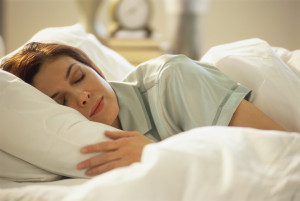7 Steps To Better Sleep
 The College of Family Physicians of Canada reports that 30-40% of adults have some amount of sleeplessness in any given year. If you’re one of them or simply want to get more zzz’s without pills, read on.
The College of Family Physicians of Canada reports that 30-40% of adults have some amount of sleeplessness in any given year. If you’re one of them or simply want to get more zzz’s without pills, read on.
Everybody needs sleep. That’s a fact. But when it comes to how much, everybody is different: Some wake up bright-eyed and bushy-tailed with a mere five hours; others need a full seven or eight — any less and they forget what the coffee maker looks like.
If you feel sleepy during the day, are more irritable or just can’t seem to function like your usual self, it could be a matter of needing more shuteye.
If you fall into the “sleep deprived” category, know that you are not alone. Statistics Canada estimates that 3.3 million Canadians over the age of 15 (that’s one in seven of us) report that they have problems falling asleep or staying asleep.
7 steps to better sleep
If you want to put an end to sleepless nights, these seven easy-to-follow tips can be just what you need.
- Stick to a schedule. That means going to bed and waking up at the same time every day — even on weekends. In time, you’ll “train” your body to follow a set cycle.
- Practice snooze control. If you need to nap during the day, limit it to 30 minutes and take it early enough in the day so that it doesn’t interfere with your nighttime sleep.
- Stick to a relaxing routine. Get into the habit of doing the same thing every night before going to bed to trigger your body for sleep. That could mean having chamomile tea, reading or taking a warm bath.
- Get comfort-wise. If you’re sleeping on an old lumpy mattress or pillows that have lost their shape, it may be time to invest in new ones. In some cases, you could just need a mattress topper so do some legwork before dishing out for a new mattress.
- Think air quality. Take steps to make your bedroom as cool or warm as you like. You may also need to buy a humidifier if the air is too dry, or a dehumidifier if you have the opposite problem. If you have known allergies (such as to dust or strong fragrances) then make sure those are in check.
- Limit light and noise. If necessary, invest in earplugs or a nighttime eye mask.
- Avoid stimulants before bed. Caffeine (coffee, tea, soda, chocolate), nicotine, alcohol, or too much food or drink could disrupt a good night’s sleep.
You’ll also be happy to know that leading a healthy lifestyle not only does your body good, it also helps you sleep better. So stick to an exercise routine that makes sense for you.
Know when to speak to your doctor
If you have ongoing sleep-related problems, then speak to your doctor. This is especially important if you’re thinking of trying over-the-counter medication or herbal remedies.
References
- American Academy of Family Physicians, Insomnia: How to get a good night’s sleep
- Canadian Psychological Association
- College of Family Physicians of Canada
- Mayo Clinic, 10 tips for better sleep:
- Statistics Canada, The Daily, Wednesday, November 16, 2005, (Health Reports, 2002)
Article written by: morethanmedication.ca


Leave a Reply
Want to join the discussion?Feel free to contribute!